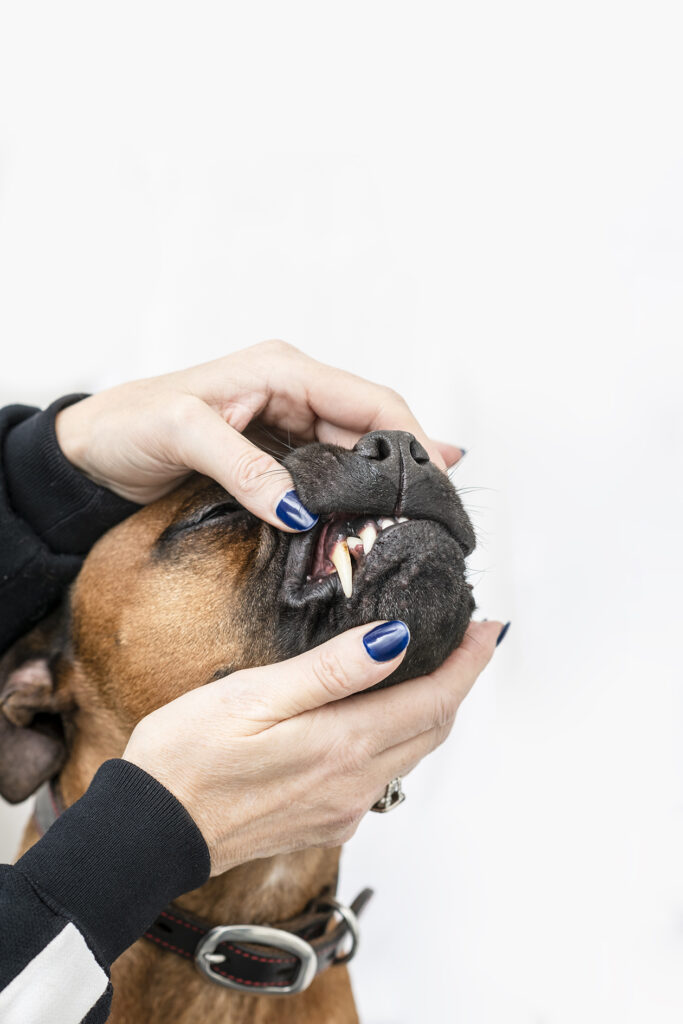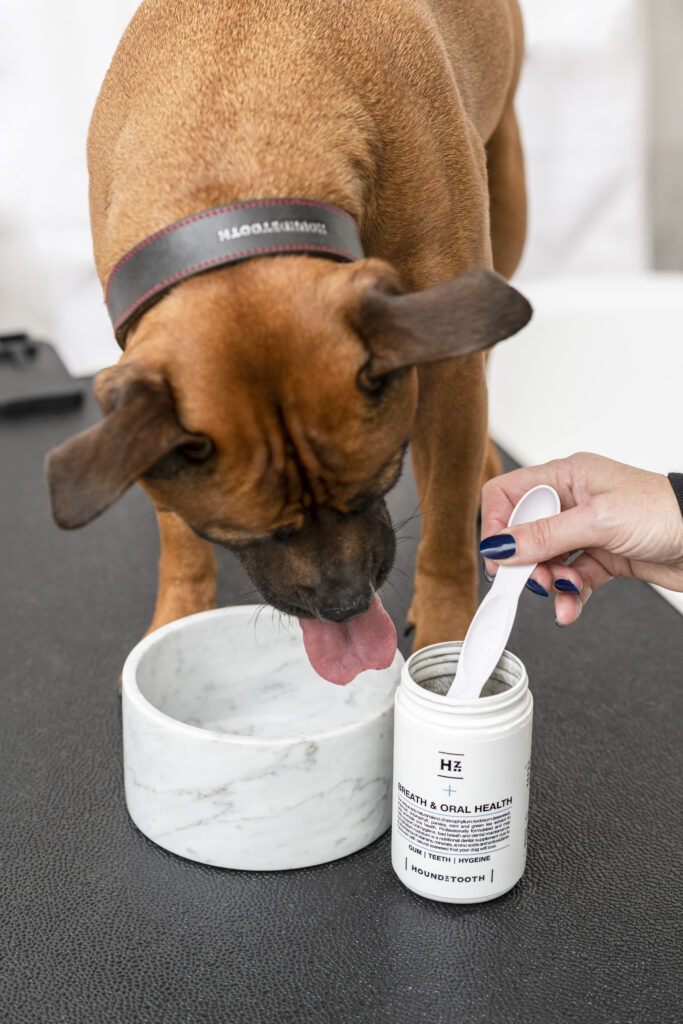5 Tips for Dog Dental Care to Enhance Oral Health
Why dog dental care is so important
Did you know that good gut health is connected to good dental health in dogs? Around 80% of dogs over the age of 3 suffer from some form of dental disease. Dental disease (periodontal disease), is inflammation of a dog’s teeth and gums which is caused by the build-up of plaque. Plaque is made up of food particles, saliva and bacteria, and sticks to the surface of the tooth. If it is not removed, plaque will calcify into tartar, which is difficult to remove and can develop into dental disease. Untreated dental disease can cause tooth loss and other painful infections in your dog’s body.
Signs of dental disease in dogs
Checking the mouth regularly
Checking your dog’s gums and teeth every few weeks will help you know if everything is going well. Their gums should be pink – not white, red, or swollen. Their teeth should be clean, without brown tartar build-up.
If you have any concerns or are unsure, we recommend taking your dog to a vet for a dog dental health check-up.

Bad breath
Bad breath can be a common sign of oral disease in your dog. True, it is natural for your dog’s breath to not smell great! But if your dog’s breath is quite unpleasant, it may be caused by dental disease or decaying teeth. It can also be a sign of poor gut health, which can be supported by a probiotic such as Houndztooth’s Prodigestive Aid, professionally formulated to suit dogs with sensitive stomachs.
Tips for good dental health for dogs
Practicing good oral health habits for your dog is the best way to avoid dental disease, bad breath and tooth decay or loss. Here are some fundamental and easy ways that you can incorporate good hygiene practices into your dog’s daily routine.
Dog dental health
Teeth-brushing & tooth-paste
Brushing a pet’s teeth may not be something you’re aware of, or know the importance of – however brushing your dog’s teeth daily or even every few days can significantly help control plaque build-up that leads to dental disease.
Be sure to use a natural specially formulated pet or dog toothpaste. Do not use human toothpaste as it can upset a dog’s stomach. The Shy Tiger Sooth & Clean Dog Toothpaste is a polish-style toothpaste which has been formulated with all-natural ingredients, providing gentle yet effective abrasive properties that maintain your dog’s dental health while being kind to their gums.
Specially-made dog and cat toothbrushes are available to purchase – check your local pet specialty store such as Habitat or PETstock.
Chewing & chew toys
Specially made chew toys and large, hard raw bones encourage your pets to gnaw and chew, and are a good addition to your dog’s oral hygiene routine. The chewing action aids in the removal of plaque via physical rubbing and the spread of protective saliva.
There are some great pet dental and toy products around, such as Kong who have a good range of chew toys available. Ensure you always supervise your dog with chew toys or bones.
Healthy diet
Your dog’s oral health and teeth could benefit from a natural, high quality, Australian made kibble made specifically for dental hygiene. The kibble is bigger, which means your dog has to chew more. As they bite through the larger kibbles, bits of plaque will rub off their teeth and chewing harder means more saliva is produced to help protect the mouth.
Gut health
Oral health and gut health are closely connected: actually, it’s a two-way street. The oral cavity, which is the first part of the digestive tract, has a unique microbiome. Poor oral health in a dog causes inflammation, which disrupts the normal oral flora and microbiome. Using a good dog-formulated probiotic that also includes prebiotics may help minimise the microbiome’s disruption – which could otherwise lead to the progression of dental disease. A probiotic will not cure existing dental or periodontal disease, but it’s a very beneficial supplement that may support gastrointestinal health in your dog, including the oral cavity. Probiotics exist to help prevent gastrointestinal tract (GIT) problems, restore a good amount of beneficial bacteria, and improve the immune system after being negatively affected by infections, antibiotics treatment, diseases, and other stressors. Read more on the benefits of probiotics for your dog here.
Dog healthy treats
A natural, low-processed dog treat is another great way to support your pet’s overall health and wellbeing. Giving your dog a treat for training or an enticing reward is not only tasty and fun for them, but also an easy way to include a variety of additional healthy ingredients supporting good nutrition.
The Houndztooth Training Treats are high-reward, single protein dog treats which are 100% natural, grain-free and made from all Australian ingredients. They contain no artificial flavours, preservatives or colours and are completely transparent with their ingredients quantities. Watch out for brands that don’t reveal this information as it’s likely that the treats contain a high proportion of fillers. The Houndztooth treats can also be broken down into smaller pieces or softened with water for dogs suffering from gum disease or teeth loss.
Prevention better than cure
Prevention is always the better way. Keep up a good oral healthcare routine and give your dog the best diet and lifestyle that you can.
Regular vet checks
We recommend your dog has regular health check-ups with your vet, and especially if you are concerned with your dog’s oral hygiene. Sometimes a vet clinic will offer free oral health check-ups, particularly during dental month, so keep your eyes peeled!
For adult dogs with existing dental disease, a scale and polish from your veterinarian is often necessary.
Houndztooth supplements support your pet’s general health and wellbeing
The Breath & Oral Health Supplement promotes oral health for your dog, and is professionally formulated and may help support oral hygiene, gums, teeth, bad breath and dental maintenance.

